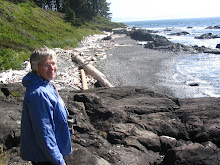 Image via Wikipedia
Image via Wikipedia
Yesterday, once I realized that the next topic was video sharing, I began to search for interesting You Tube videos. Three that I found were related to current news items (United Breaks Guitars, Dave Carroll's response to United's offer of compensation, and a video to provide context to the still photo of Obama in France). Besides the Bananas Foster recipe, there were many other How-To videos: Watermelon nails, Make a Kappa Maki roll, and a tutvid on using Photoshop to create an I-Tunes picture. This guy is an amazing teacher. I wish I had Photoshop just to try to do what he taught. I could see this video used in a high school or technical college to teach students to use all the drawing tools at their disposal. Tutvid also has many other tutorials on photography and drawing. I have subscribed to his blog posts because he seems like a very interesting guy. He's so willing to share what he kno
 Image via Wikipedia
Image via Wikipedia
Could it be the same thing with our computer or technological knowledge? What if we could get the information we needed Just in Time, exactly when we needed it. Just as my brother-in-law found and used a Bananas Foster recipe within a half-hour time period, what if we had collections of You Tube videos which provided Just in Time, informal learning, very specific subject matter assistance to our students when they needed it? Obviously, we would need lots of computers to provide that access. I continue to be concerned for those living outside of the wired world--the half of my students with no computer at home. As the rest of us zip forward, what kind of dust are they eating?
This morning I was looking at a publication from a technology conference in Prague.
(Piedra, N., Chicaiza, J., Lopez, J., Tovar, E., &
I have the PDF file (I had to go through my University library to get to it) if you would like it. Here are some quotes from the article:
The role of education in knowledge society requires that teachers transform their roles from instructors and knowledge dispensers to facilitators and mentors of open educational practices.
The development of competences, knowledge and abilities requires that students assume an active, constructive, and collaborative role instead of a passive role in which they receive, assimilate and reproduce the knowledge.
The alternative to learning materials repositories, descendent and teacher-centered, is the promotion of open educational practices that give teachers and students the capacity, based on their efforts, to create repositories OER where they can be cocreators of open contents. The access to educational resources is not a solution itself and requires practices that encourage a culture that promotes collaboration.
To improve the re- usability of contents and services, either for creation or provision, it must take into account the utilization of standards and open content formats, use of open licenses such as
There is a web or semantic map of OER (Open Educational Resources) presented in that article. I was trying to paste it here but can't do it. For me
 Image via Wikipedia
Image via Wikipedia
I guess that was my little detour from purely looking at video sharing as part of educational practice. I will post more later.
![Reblog this post [with Zemanta]](http://img.zemanta.com/reblog_e.png?x-id=b14233ac-9790-4184-852b-7e8844bca7e7)





No comments:
Post a Comment